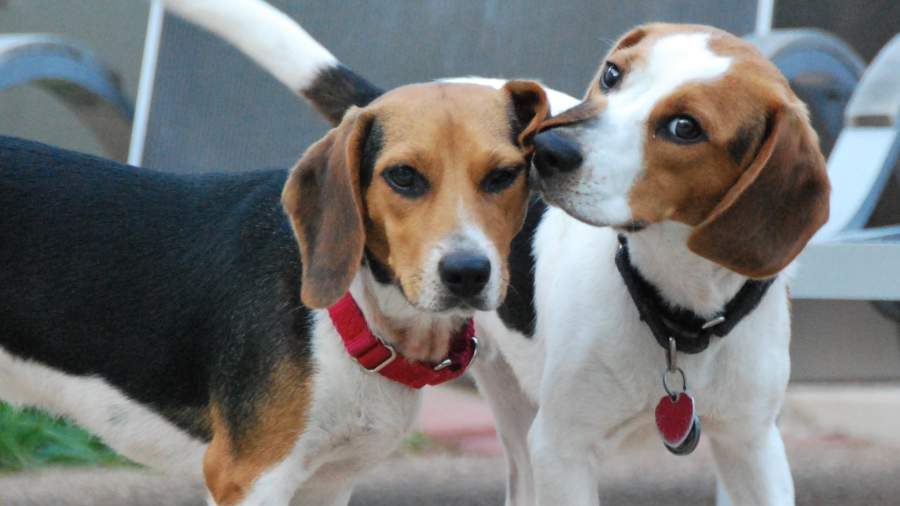FAQ– How do I know if my dog is spoiled?
 Here’s a simple test. First, get a piece of paper and list everything your dog expects from you, then next to that list everything you expect from your dog. Now compare the two. If your first list is significantly longer than your second, congratulations your dog is spoiled! Hardly anyone appreciates a spoiled child so why do we think it’s okay to spoil our dogs? As the guardians to our pets it is very normal to be nurturing and protective, but just as in any relationship, too much of a good thing can be bad. According to the dictionary the word ‘spoiled’ is used to describe someone or something that is harmed in character by being treated too leniently or indulgently. A simple definition of spoiling your dog is I love you when you’re good and I love you when you’re bad, but I don’t take the time to teach you the difference. This attitude gives our dogs the perception that everything they do is right or appropriate, which we all know is simply not the case. Believe it or not, when dogs go undisciplined they often lack confidence, as they don’t understand how the world works and often don’t feel safe in their environment. Spoiled dogs don’t have to work for food, warmth, security and relationships. Just like children, if we do not prepare our dogs for a society set on rules and boundaries, we are not setting them up for success.
Here’s a simple test. First, get a piece of paper and list everything your dog expects from you, then next to that list everything you expect from your dog. Now compare the two. If your first list is significantly longer than your second, congratulations your dog is spoiled! Hardly anyone appreciates a spoiled child so why do we think it’s okay to spoil our dogs? As the guardians to our pets it is very normal to be nurturing and protective, but just as in any relationship, too much of a good thing can be bad. According to the dictionary the word ‘spoiled’ is used to describe someone or something that is harmed in character by being treated too leniently or indulgently. A simple definition of spoiling your dog is I love you when you’re good and I love you when you’re bad, but I don’t take the time to teach you the difference. This attitude gives our dogs the perception that everything they do is right or appropriate, which we all know is simply not the case. Believe it or not, when dogs go undisciplined they often lack confidence, as they don’t understand how the world works and often don’t feel safe in their environment. Spoiled dogs don’t have to work for food, warmth, security and relationships. Just like children, if we do not prepare our dogs for a society set on rules and boundaries, we are not setting them up for success.

DOG OF THE MONTH – Pippi

Say hello to Pippi, an active ten month old Malinois mix. Pippi isn’t new to CANIS as she has returned for her second round of training with us, this time to complete her off leash obedience. At home Pippi enjoys the company of a variety of other animals friends. She loves playing with her family, and is very curious and intuitive.
RELATIONSHIP BUILDER TIPS –
The right was to socialize your dog in public
First thing’s first, most of you may know this but for those who don’t, socializing your  dog is always best done as early as possible. Studies have shown that puppies are most receptive within the first 3-4 months, after this period it gets harder for them to accept things that are unfamiliar. If for any reason you missed this period in your dog’s life, it’s never too late to get your dog socialized. The best and easiest way to acclimate your pup to society and the outside world, starts with a nice long walk! Many owners underestimate the power of a proper walk and because of this leash reactivity is one of the most common issues we see in training. The exercise gets rid of pent up energy and allows them to approach new situations in a much calmer and submissive state. If you encounter something new on your walk, maybe a squirrel or another person walking their dog, it is very important to stay calm, as your dog can sense the tension in your body. If you are panicked or worried, they feel that they should be too. When approaching a new person or another dog on leash, it is very important to keep distance. Your dog’s reaction can easily become a negative one if they feel that they are in any form of danger or threat. Even though your intentions are simply to introduce your pup to a new friend, often their priority is their own wellbeing and keeping you safe. Make sure you respect the other dog’s space as well, don’t just let your dog run up and start sniffing. Once you’ve got the walk down properly and you’ve mastered the neighborhood, start exploring places and situations that are busier and more social. Public parks are usually busier but still calm, making them perfect for introducing new distractions like other people, children, animals, bikes, skateboards, maybe even a few sports games. Never try to rush you dog into any situation, it often helps to let your dog first observe the new situation before interacting or participating. Take everything one step at a time and introduce new things slowly, attempting to rush the process can backfire and cause your dog to become more anxious and reactive.
dog is always best done as early as possible. Studies have shown that puppies are most receptive within the first 3-4 months, after this period it gets harder for them to accept things that are unfamiliar. If for any reason you missed this period in your dog’s life, it’s never too late to get your dog socialized. The best and easiest way to acclimate your pup to society and the outside world, starts with a nice long walk! Many owners underestimate the power of a proper walk and because of this leash reactivity is one of the most common issues we see in training. The exercise gets rid of pent up energy and allows them to approach new situations in a much calmer and submissive state. If you encounter something new on your walk, maybe a squirrel or another person walking their dog, it is very important to stay calm, as your dog can sense the tension in your body. If you are panicked or worried, they feel that they should be too. When approaching a new person or another dog on leash, it is very important to keep distance. Your dog’s reaction can easily become a negative one if they feel that they are in any form of danger or threat. Even though your intentions are simply to introduce your pup to a new friend, often their priority is their own wellbeing and keeping you safe. Make sure you respect the other dog’s space as well, don’t just let your dog run up and start sniffing. Once you’ve got the walk down properly and you’ve mastered the neighborhood, start exploring places and situations that are busier and more social. Public parks are usually busier but still calm, making them perfect for introducing new distractions like other people, children, animals, bikes, skateboards, maybe even a few sports games. Never try to rush you dog into any situation, it often helps to let your dog first observe the new situation before interacting or participating. Take everything one step at a time and introduce new things slowly, attempting to rush the process can backfire and cause your dog to become more anxious and reactive.
TRAINING CERTAIN BREEDS – Beagles


There aren’t too many breeds that can own up to being as hardy, friendly, intelligent and cute as the Beagle. They are extremely intelligent, social and make great family dogs, which has also made them very popular in the entertainment industry, staring in many cartoons, films and TV shows like Snoopy from The Peanuts and Underdog. They were bred originally in Great Britain in the 1830s, with the goal of creating a small sturdy hunting hound with a strong drive and powerful nose. Often used to hunt in packs, their small stocky bodies were perfect for staying low to the ground and allowed them to get into small tight spaces to catch small game like rabbits and hares. Another appeal was the ability to use them for hunting on foot which allowed lower class people to participate in the sport as well, as most hunters traditionally followed their hounds on horseback. Beagles are extremely curious, friendly and merry, and out of 193, they rank sixth in the AKC Breed Popularity.

Beagles have been known to be “big for their inches” and their strong echoing howl makes them excellent doorbells, however the tone and volume has been known to cause a nuisance. Because they were bred to be an active working dog, if not properly exercised Beagles can be prone to obesity. Owners who are unaware of their history and true nature often complain that they are “too nosy” and “easily distracted”, when in actuality they are being super vigilant about their surroundings and experiences. If you were to ask a Beagle what he did in a day, he could give you the scoop on the whole neighborhood. Because they are so focused with their nose, the key to training a beagle is their food drive, consistency and real life rewards. Giving a real life reward is allowing them to do things they are bred or predispositioned to do (i.e if you sit, stay, come, focus on me you can then sniff, run, play etc.). Any dog with a hardwired predisposition or behavior needs to be rewarded with that same behavior. If you are thinking about adding a Beagle to your life, we recommend training early on with a heavy focus on patience and recall work, as well as plenty of exercise!

Post Written By: Greer E. Darden

